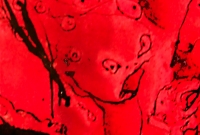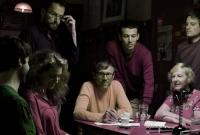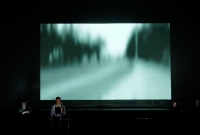La Folia, on-line music review, Grant Chu Covell, June 2004
Georges Aperghis, Die Hamletmaschine Oratorio
Die Hamletmaschine-oratorio is serious but never pretentious. Each movement is framed by the lone violist lassoing a squirming line ripe with insinuating glissandi and microtones. Aperghis wastes no time introducing strident high winds and the aggressive chorus. A slightly oppressive mood persists for the whole hour. The pacing is brisk and varied. From the beginning there’s a funny buzzing sound off to one side, like a kazoo or duck whistle. This is Drouet’s doing. Sometimes he’s producing a scraping noise or speaking, at other times he’s a conventional percussionist. Don’t think we’re in some cutesy Cage-like land of nods and winks. Aperghis jettisons us behind enemy lines to view the carnage on our own.
Aperghis harnesses great power from Müller’s language. The words, sometimes resolving to several simultaneous threads, are always audible from the prominent soloists and chorus. French and German appear simultaneously, but never is it suggested that soloists are glossing chorus or vice versa. Sometimes we hear a Bach-like chorale. Aperghis frequently repeats entire phrases such as in the central Scherzo, a tour de force wherein Drouet (his voice recognizable from another Aperghis disc) delivers the repetitions (text and the embedded stage directions) in a dispassionate newscaster’s patter. Aperghis thrives in that Saussurian haze where a meaningful phrase can dissolve into colorful-sounding phonemes.
Le Monde, September 8th, 2002. Pierre Gervasoni
CD : GEORGES APERGHIS
At its debut at the Musica Festival in Strasburg two years ago (Le Monde of 7 October 2000), the Hamletmaschine Oratorio struck the audience with its ability to transcend, for an entire hour, an entirely gut feeling. The CD provides the opportunity to dig at leisure – if that can be said about the Hamlet(s) theme taken up by Heiner Muller’s terrifying language – in this visceral masterpiece. Genevieve Strosser’s performance as an Ophelia of uncalled-for candour lays bare the very heart of Georges Aperghis’s music (Aperghis was born in 1945). You discern in the entrails of a gripping hybridisation a possible kinship with some of Bernd Alois Zimmermann’s desperate transplants (‘Requiem for a Young Poet’, for example). You diagnose everywhere a refusal of the consensual attitude that is currently anaesthetising the avant-garde under many of its practitioners’ fingers - P.G.
Nederlandse Versie
Artikel verschenen in Le Monde van 8 september 2002
Bij zijn creatie twee jaar geleden tijdens het Musicafestival in Straatsburg (zie Le Monde van 7 oktober 2000) trof Die Hamletmaschine-Oratorio door zijn kracht om een heel uur lang een expressie, die volledig geconditioneerd is om je fysiek te grijpen, te transcenderen. De CD maakt het mogelijk om in alle rust - als men dat al kan zeggen in verband met de thematiek van de Hamlet(s) die door de schrikwekkende taal van Heiner Müller wordt aangepakt - dit viscerale meesterwerk te beluisteren. In de partijen van Geneviève Strosser, een Ophelia met een misplaatste onschuld, ontwaren we het naakte hart van de muziek van Georges Aperghis (geboren in 1945). In het binnenste van een pakkende hybridisatie voelen we de mogelijke verwantschap met sommige wanhopige entingen van Bernd Aloïs Zimmermann (bijvoorbeeld Requiem voor een jonge dichter). Over de hele lijn merken we een weigering van de consensuele houding die vandaag in de muziek meerdere avant-gardekunstenaars anestheseert._
La Lettre du Musicien, été 2001
Die Hamletmaschine-Oratorio" de Georges Aperghis aux Bouffes du Nord
L'oratorio d'Aperghis propage un incendie qui ne s'éteint pas, projette une clameur furieuse qui ne s'atténuera pas. (...) Prestation exemplaire de l'Ensemble Ictus et de l'Ensemble vocal SWR Stuttgart dirigé par Georges-elie Octors, avec notamment le percussionniste Jean-Pierre Drouet.
Tags : Press, Romain Bischoff





